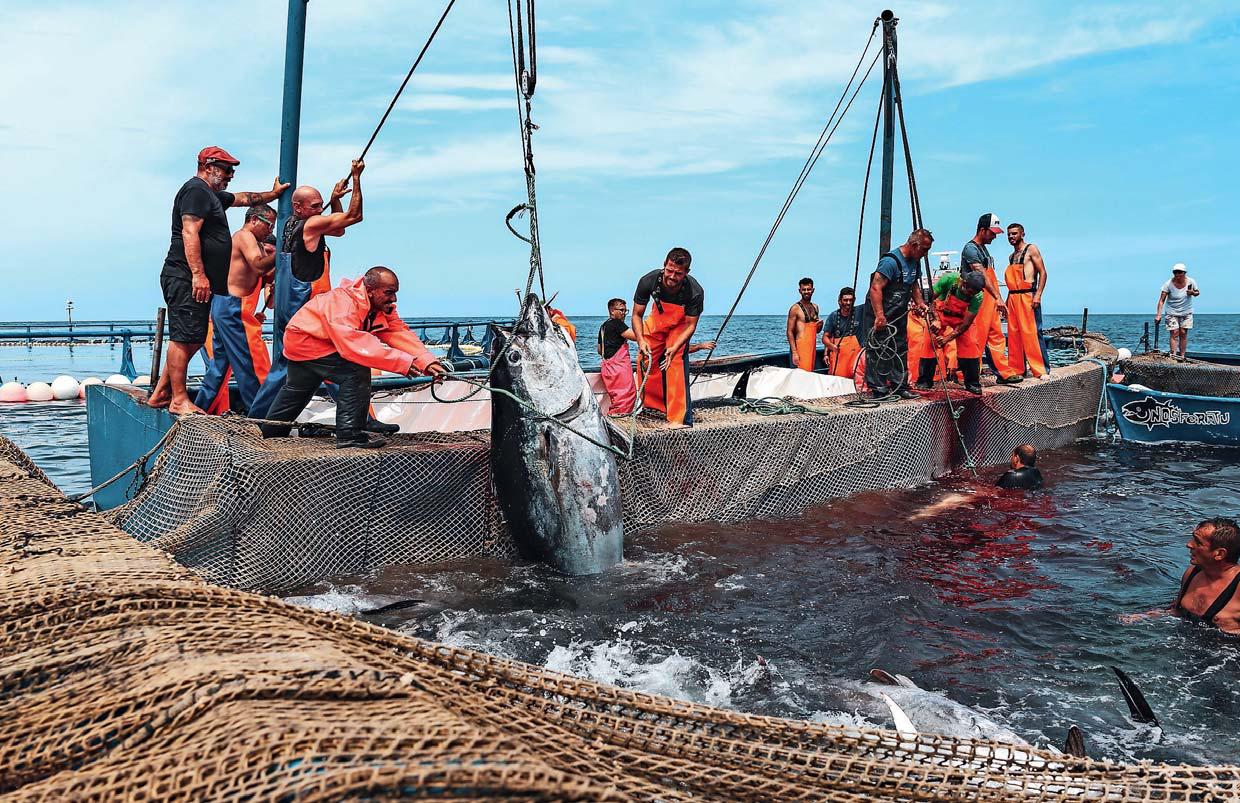
On an overcast morning, several kilometres off the east coast of Sardinia, four men jump into a net where 49 giant Atlantic bluefin tuna are fighting for their lives.
For more than 30 minutes, the men struggle in a frenzy of nets, tails, fins and sleek silvery bodies before finally securing a metal hook through the gills of the nearest fish. From one of the seven wooden boats that frame this càmira dâ morti ("chamber of death"), Luigi Biggio yells for his men to pull.
As 28 men look on, a majestic creature about three metres long, weighing 120kg is raised out of the water with a pulley. On the biggest boat, one man swiftly cuts its jugular and the vessel fills with blood.
Biggio, 57, runs a tonnara, the Italian version of an ancient Mediterranean fishing custom, which traps and harvests bluefin tuna in the gruesome struggle known in Italy as the mattanza (or "killing"). Biggio comes from a long line of rais (from the Arabic for chief), almost sacred leaders of the hunt - a mantle passed down from father to son in designated families.
"We carry on a tradition that's thousands of years old," Biggio says. "We continue it with pride."
The harvest is violent and can seem barbaric, as the dying tuna are hooked with a gaff, stabbed and hoisted on to boats. However, fishing experts regard it as a rare sustainable method of catching bluefin tuna, one of the world's most overfished species.
Despite its merits, Italy's tonnare face extinction. But they are not disappearing because of a lack of fish. While the practice was threatened in the early 2000s by a collapse in tuna populations due to commercial overfishing, EU regulations have helped recover these numbers over the past decade. But Italy's small-scale and traditional fishers have largely failed to secure permits under successive governments since the start of the quota system, and are now struggling to compete with big fleets.
This story is from the {{IssueName}} edition of {{MagazineName}}.
Start your 7-day Magzter GOLD free trial to access thousands of curated premium stories, and 9,000+ magazines and newspapers.
Already a subscriber ? Sign In
This story is from the {{IssueName}} edition of {{MagazineName}}.
Start your 7-day Magzter GOLD free trial to access thousands of curated premium stories, and 9,000+ magazines and newspapers.
Already a subscriber? Sign In

If kids get protected from online harm, how about the rest of us?
The Australian government has proposed a ban on social media for all citizens under 16.

'It's not drought - it's looting'
Spain is increasingly either parched or flooded - and one group is profiting from these extremes: the thirsty multinational companies forcing angry citizens to pay for water in bottles.

Life in the grey Zone
Neonatal care has advanced so far that babies born as early as 21 weeks have survived. But is this type of care always the right thing to do?

Out of tune? Band Aid under fire for Africa tropes as it turns 40
Forty years ago this month, a group of pop stars gathered at a west London studio to record a single that would raise millions, inspire further starry projects, and ultimately change charity fundraising in the UK.

Deaths shine spotlight on risks of drinking on party trail
Vang Vieng is an unlikely party hub. Surrounded by striking limestone mountains and caves in central Laos, it morphed from a small farming town to a hedonistic tourist destination in the early 2000s.

Different strokes My strange and emotional week with an AI pet
Moflin can develop a personality and build a rapport with its owner - and doesn't need food or exercise. But is it comforting or alienating?

Strike zone Waking up to the rising threat of lightning
When the Barbados National Archives, home to one of the world's most significant collections of documents from the transatlantic slave trade, reported in June that it had been struck by lightning, it received sympathy and offers of support locally and internationally.

Cheap pints and sticky carpets: the old-school pub is back
In the Palm Tree pub, east London, barman Alf is taking only cash at the rattling 1960s till.

Brain gain Can a radical tax scheme convince the country's brightest to stay?
In the autumn of 2018, I moved to Lisbon for a month-long course at the Universidade .de Lisboa.

Fear and sympathy in small town divided over asylum camp
A year after anti-immigration riots, a site for asylum seekers faces hostility while some locals try to help new arrivals